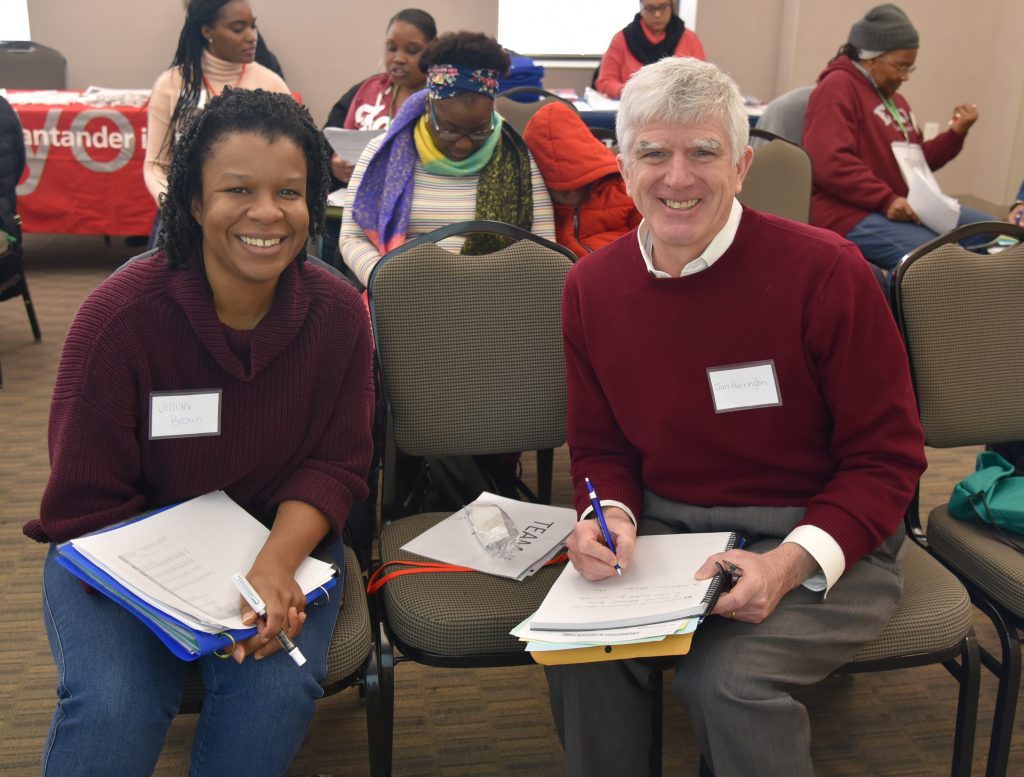
At Clarifi, our theory of change is centered around the relationship between our clients and their counselors. We believe that trust is the most effective tool we have to help people overcome barriers and reach their financial goals. So, as we were asked about volunteer opportunities, we knew we had to offer something that properly captured that spirit. Thus, our Boot Camp program was born.
The Boot Camp is a cohort-based model that brings together a group of twenty to thirty individuals that share a common goal, such as homeownership. To help reach that goal, we offer three unique services: group workshops, one-on-one sessions with a certified financial counselor, and lastly, matching clients with a volunteer coach. Coaches, rather than giving financial advice like a counselor, help clients achieve their financial goals by cheering them on and keeping them accountable to their Action Plans.
Few people know this program better than Clarifi’s own board chair, Nancy Rosenau, who has served as a coach to three individuals since the program launched in 2015. “People can find it hard to get involved”, Nancy admits, “But the key is being open, a good listener, and having patience.” She recalls a particularly difficult time she had reaching a client for a monthly check in: “After trying to call her a few times, I finally got a hold of her. She was quite upset and worried about her progress. That’s when the training I received kicked in. We talked through the problems she was having, and we were able to complete her check in and get her excited about her goals again.”
Nancy emphasized the strength and quality of the program’s training as something that has become crucial in her role as coach. “Sometimes the hesitation to get involved comes from someone thinking ‘I don’t know if I can do this’, but the comfort level rises with the training. At the end of the day, it’s a one-hour phone call, once a month. It’s just having a conversation to encourage someone to take the right steps and make a big difference in their lives.” And to her it’s well worth it: “It’s the opportunity to look past yourself, and you get to see the level of commitment that people have to take this journey, and how they keep going! It’s inspiring, and it’s important to let them know they’re not alone! The perseverance is incredible, and that’s what we’re providing to the client by cheering them on.
Jim Harrington, another Clarifi board member, told us that after retiring from Vanguard, he wanted to help people who couldn’t access the services companies like his offered. That’s how he got connected with the coaching program, seeing huge potential with the model. “The clients are grouped together in a cohort, so they don’t feel alone in what they’re doing. Once they’re introduced to their coach, the coach does not give specific advice, but acts as a resource and provides accountability. We help set the intermediary goals between the big goals they’ve laid out with their counselor in their Action Plan. We’re empowering the client to manage their personal finances, not telling them what to do. Just having a conversation about what worked and what needs work, that gives them the confidence to do these things themselves.”
Jim echoed Nancy’s sentiments on what makes a good coach, underlining the importance of empathy, and being a good listener. By discussing and sharing thoughts and ideas, the coach can understand the client’s struggles, aspirations and concerns. Jim also said that a coach should be “optimistic, hopeful, and engender a positive atmosphere. It’s important to give the client kudos for putting themselves out there and reaching out for help in this way.”
Still, it’s not just casual conversation. “It’s very important to remember that becoming a coach is a commitment, it’s incredibly gratifying to support another person” Jim said, “but that commitment is also to represent that specific individual, as well as Clarifi. Engaging the client and honoring that commitment is crucial.”
Interested in becoming a coach yourself? Learn more here.